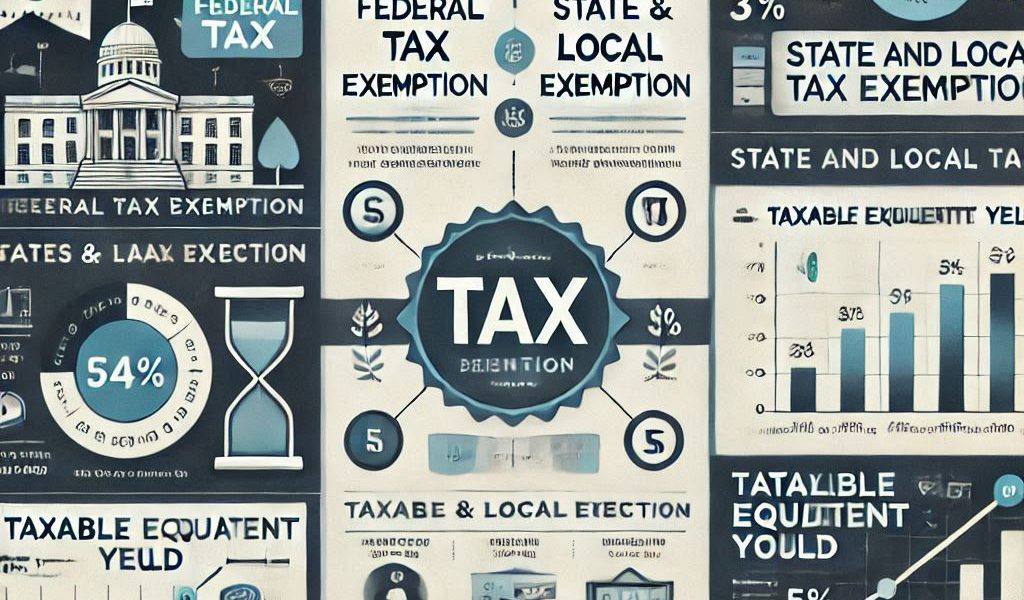When it comes to tax-efficient investing, municipal bonds are often overlooked by many investors. However, municipal bonds can offer significant tax advantages, making them an appealing option for those looking to maximize their after-tax returns. In this blog, we will dive into the tax benefits of investing in municipal bonds, how they work, and why they should be considered as part of a well-rounded investment strategy.
What Are Municipal Bonds?
Municipal bonds, also known as “munis,” are debt securities issued by state, local, or other governmental entities to fund public projects such as infrastructure, schools, and hospitals. When you invest in a municipal bond, you are essentially lending money to the government in exchange for periodic interest payments and the return of your principal at maturity.
Municipal bonds come in two main types:
- General Obligation Bonds (GO Bonds): These are backed by the credit and taxing power of the issuing government.
- Revenue Bonds: These are backed by the revenue generated from a specific project or asset, like tolls from a bridge or fees from a public utility.
The Tax Benefits of Municipal Bonds
The most attractive feature of municipal bonds is the tax benefits they offer. Here’s how investing in munis can help you reduce your tax liability:
1. Federal Tax Exemption on Interest
One of the key reasons investors are drawn to municipal bonds is that the interest income earned from most municipal bonds is exempt from federal income tax. This means that if you invest in municipal bonds, you will not have to pay federal taxes on the interest you receive from them.
For example, if you earn $1,000 in interest from a municipal bond, you won’t owe any federal tax on that amount. This tax exemption can significantly increase your after-tax income, especially for high-income earners in higher tax brackets.
2. State and Local Tax Exemption
In addition to being exempt from federal taxes, the interest income from municipal bonds may also be exempt from state and local taxes, depending on where you live and where the bond was issued. For example, if you live in California and purchase a municipal bond issued by the state of California or a local municipality within California, you may not be subject to state or local taxes on the interest income.
However, if you invest in a municipal bond issued by another state, the interest income may still be subject to state or local taxes. It’s important to research the specific tax rules in your state to determine if this benefit applies.
3. Tax-Advantaged Bonds for Specific Purposes
Certain types of municipal bonds offer additional tax benefits. For example, Qualified 501(c)(3) Bonds (issued for nonprofit organizations) and Municipal Bonds for Social Programs may be eligible for tax credits or deductions that further enhance their tax advantages. These bonds may offer not only the traditional federal tax exemption but also additional incentives designed to encourage investment in socially beneficial projects.
4. Tax-Deferred Growth
For investors holding municipal bonds in a tax-advantaged account like an IRA or 401(k), the interest income from the bonds grows tax-deferred until the funds are withdrawn. This allows you to reinvest the interest income without having to pay taxes on it immediately, further compounding your returns over time.
5. Lower Taxable Equivalent Yield
Since municipal bonds are exempt from federal taxes (and possibly state and local taxes), they offer a lower yield than taxable bonds. However, the tax-free nature of the income makes municipal bonds an attractive option for investors in higher tax brackets. To calculate the taxable equivalent yield (TEY) of a municipal bond, use the following formula:
Taxable Equivalent Yield = Municipal Bond Yield / (1 – Tax Rate)
For example, if a municipal bond yields 3% and you are in the 35% federal tax bracket, the taxable equivalent yield would be:
Taxable Equivalent Yield = 3% / (1 – 0.35) = 4.62%
This means that in terms of after-tax income, a municipal bond with a 3% yield is equivalent to a taxable bond with a 4.62% yield for someone in the 35% tax bracket.
6. Capital Gains Tax Considerations
While the interest income from municipal bonds is typically exempt from federal taxes, any capital gains from selling municipal bonds before maturity may still be subject to taxes. If you sell a municipal bond for more than its purchase price (resulting in a capital gain), you will owe taxes on the profit. This is important to keep in mind if you plan to sell your bonds before they mature.
However, if you hold the bonds to maturity, you will receive your original investment back, and there will be no capital gains tax. The only tax liability will be on the interest income you earn.
Why Should You Invest in Municipal Bonds?
Municipal bonds can be an attractive option for a variety of investors, especially those looking for stable, tax-advantaged income. Here are some reasons to consider investing in municipal bonds:
- Tax Benefits: The federal and potentially state/local tax exemptions make municipal bonds a powerful tool for reducing tax liability, especially for high-income earners.
- Low Risk: Municipal bonds are generally considered to be low-risk investments, especially if they are issued by creditworthy municipalities. They are often rated by agencies such as Moody’s or Standard & Poor’s, which can provide investors with an indication of the bonds’ creditworthiness.
- Stable Income Stream: Municipal bonds provide a reliable stream of income, which can be attractive for retirees or those looking for stable cash flow. The interest is typically paid semi-annually, providing a predictable income.
- Diversification: Including municipal bonds in your portfolio can help diversify your investments, balancing the risk of stocks or corporate bonds with a lower-risk, tax-efficient asset class.
- Socially Responsible Investment: Many municipal bonds fund projects that benefit communities, such as education, healthcare, and infrastructure. By investing in munis, you may be supporting socially responsible initiatives.
Things to Consider Before Investing in Municipal Bonds
While municipal bonds offer many benefits, there are also some risks and considerations to keep in mind:
- Credit Risk: While municipal bonds are considered low-risk, they are not risk-free. Some municipalities may face financial difficulties, leading to potential defaults.
- Interest Rate Risk: Rising interest rates can negatively impact the price of municipal bonds, as bond prices typically fall when rates rise.
- Inflation Risk: Municipal bonds are subject to inflation risk, as rising inflation may erode the purchasing power of the interest payments you receive.
Conclusion
Municipal bonds are an excellent option for investors looking to reduce their tax liability while earning a stable income. The federal and state tax exemptions, along with the opportunity for tax-deferred growth in retirement accounts, make them an appealing choice for high-income earners and those seeking to diversify their portfolios.
By understanding the tax benefits and risks associated with municipal bonds, you can make informed decisions that align with your financial goals and tax strategy. Whether you’re new to investing or a seasoned investor, municipal bonds can be a valuable addition to your investment plan.




